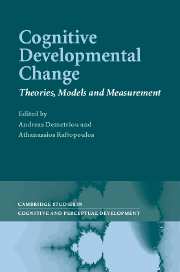Book contents
- Frontmatter
- Contents
- List of contributors
- Preface and acknowledgements
- Introduction: the what, how and why of developmental change: the emergence of a new paradigm
- 1 Mind, intelligence and development: a cognitive, differential and developmental theory of intelligence
- 2 Types of cognitive change: a dynamical, connectionist account
- 3 Developmental patterns in proportional reasoning
- 4 Building general knowledge and skill: cognition and microdevelopment in science learning
- 5 Cognitive change as strategy change
- 6 The emergence of mind in the emotional brain
- 7 Practices of quantification from a socio-cultural perspective
- 8 Contributions of central conceptual structure theory to education
- 9 Accelerating the development of general cognitive processing
- 10 Dealing with change: manifestations, measurements and methods
- 11 Dynamic modelling of cognitive development: time, situatedness and variability
- 12 Modelling individual differences in change through latent variable growth and mixture growth modelling: basic principles and empirical examples
- Index
- References
8 - Contributions of central conceptual structure theory to education
Published online by Cambridge University Press: 22 September 2009
- Frontmatter
- Contents
- List of contributors
- Preface and acknowledgements
- Introduction: the what, how and why of developmental change: the emergence of a new paradigm
- 1 Mind, intelligence and development: a cognitive, differential and developmental theory of intelligence
- 2 Types of cognitive change: a dynamical, connectionist account
- 3 Developmental patterns in proportional reasoning
- 4 Building general knowledge and skill: cognition and microdevelopment in science learning
- 5 Cognitive change as strategy change
- 6 The emergence of mind in the emotional brain
- 7 Practices of quantification from a socio-cultural perspective
- 8 Contributions of central conceptual structure theory to education
- 9 Accelerating the development of general cognitive processing
- 10 Dealing with change: manifestations, measurements and methods
- 11 Dynamic modelling of cognitive development: time, situatedness and variability
- 12 Modelling individual differences in change through latent variable growth and mixture growth modelling: basic principles and empirical examples
- Index
- References
Summary
Cognitive change lies at the very heart of the educational enterprise. It is what schooling is intended to produce. It underlies the changes in performance that are expected in school, in a variety of subject areas, as students progress through the grades and it underlies the competencies that are routinely measured in year-end assessments. Evidence of cognitive change is the single biggest factor that can earn a school a commendation, and the lack of such evidence the single biggest factor that can put a school out of business. Given the importance of this construct to education, it is disappointing that research in the field of cognitive change has not been made more available or accessible to educators – so that it can inform practice – and conversely, that current dilemmas in the field of education have not been made more salient to cognitive psychologists – so that insights gained in efforts to map the mind can be used to offer potential solutions to educational problems. A primary goal of the present chapter is to bridge this gap.
The three questions posed in the present volume – What is it that changes in cognitive development? How does change occur? Why does change occur? – provide an excellent starting point for this endeavour. By highlighting central aspects of cognitive change – aspects that any particular theory must address – they provide an opportunity for each author to describe (1) core postulates of a recent theory and (2), in the present chapter at least (see also Fischer, this volume; Adey, this volume), the educational implications that can be derived from each postulate.
- Type
- Chapter
- Information
- Cognitive Developmental ChangeTheories, Models and Measurement, pp. 264 - 295Publisher: Cambridge University PressPrint publication year: 2005
References
- 3
- Cited by

